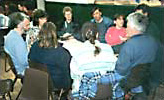Learning the Lessons - Participation
Sustainability | Strategic Approach | Participation | Partnership | Alignment | Capacity Building | Affordability | Transferability
‘Enabling people to play a positive and active role in building a viable community for the future’

Dùthchas set out with the clearly stated aim of giving everyone who wished to, the chance to have a say in the process. This was an ambitious aim but was felt to be essential to rooting the Strategies firmly in the local communities, meeting the true needs of all sectors of those communities and building the ownership and support essential to ensuring their implementation. In setting out to do this, we realised that such a participative approach is not the usual way of doing business. We were aware of previous work that had been done on participatory approaches, but not in the ambitious context of strategic, sustainability planning.
We set about developing methods which we hoped would meet our aims for participation, i.e. of being accessible, transparent, inclusive and democratic. We chose our Area Co-ordinators with great care to be the best facilitators of this process and we trained them in the different methods for each step in the process. This all worked well and we were proud of this work. We succeeded in involving a high percentage of the local people in each area (approximately 1,500 out of a total of 4,500). We were successful in involving those people whose voices are not normally heard. We enabled communities and agencies to work together, share ideas and information, develop strategic thinking and initiate action and showed that obstacles can be overcome in working together towards common goals.

All those involved learnt lessons about participatory approaches, what works and what does not. These approaches have gone on to be used by people in the communities and by agencies. The difficulties that arose came not from the aim of participation, nor in most cases from the methods themselves, but from the amount of time taken before tangible results could be seen. The reasons for these delays were more to do with the complexity of the strategic process and the need to meet the differing demands of all players. Probably the strongest single lesson to come out of the Project was that the valuable and scarce voluntary time of local people must be used with respect and to the greatest effect to give rapid tangible results.
In summary, some of the key lessons of a participatory approach were that it:
- roots the ownership of the Strategy within the area and produces support, enthusiasm and commitment ensures that the Strategy meets locally identified needs
- generates great energy but requires tangible outcomes in the short term
- is essential to successful implementation on the ground
- enables clearly targeted, cost-effective solutions
- gives a human touch to plans and policies
- builds awareness, connections and capacity for action
- requires co-ordination and skilled facilitation
- requires independent resourcing that does not compromise the process or outputs
- leans on people’s voluntary time and must be tailored for maximum efficiency
Dùthchas succeeded in involving:
All households in the Pilot Areas circulated with the key information (4500 total population)
| 140 | in the initial public meetings |
| 1,200 | in the Initial Review |
| 60 | in the Area Advisory Groups |
| 75 | on Strategy Groups |
| 85 | in Task Groups |
| 18 | in trans-national study tours and 50 in UK study visits |
| 250 | in conferences and seminars |
